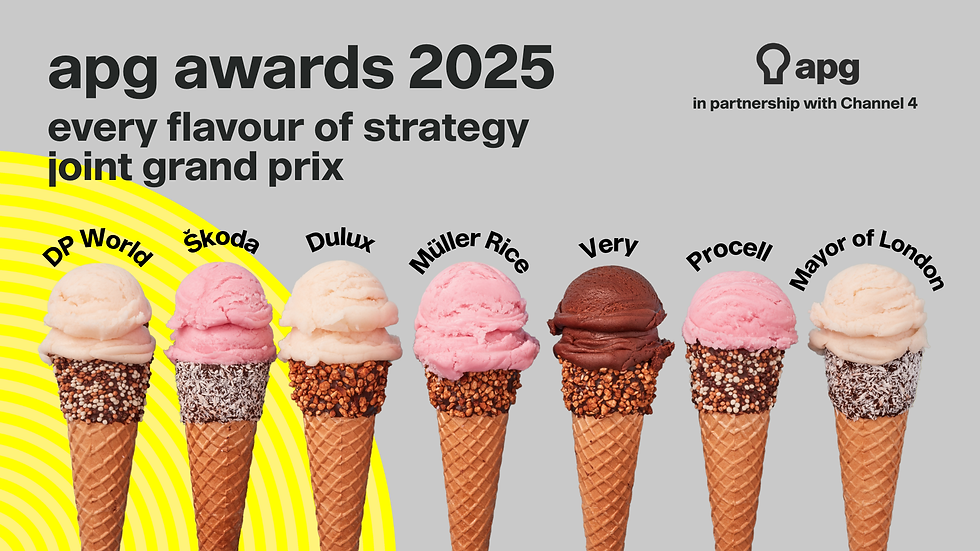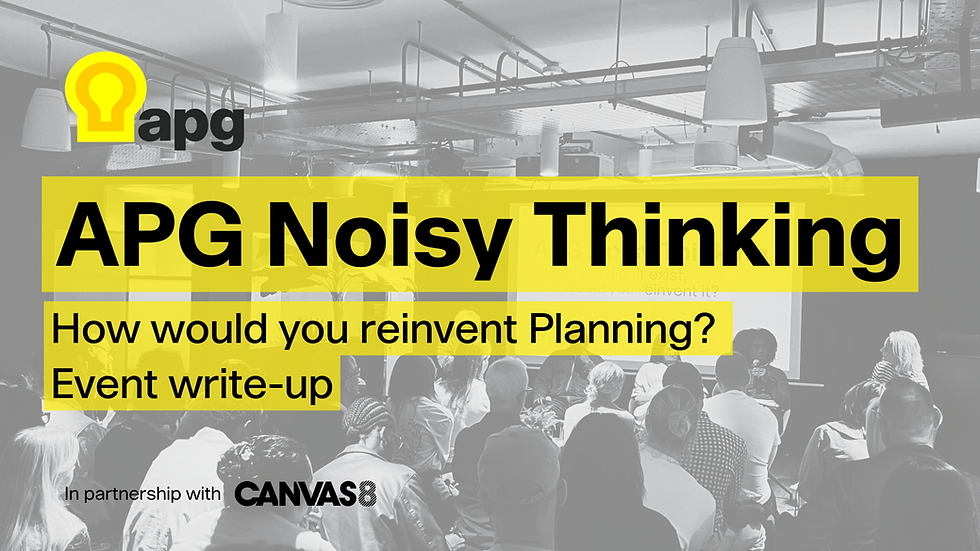How To Get On: Gen X Edition
- APG

- Oct 23, 2017
- 4 min read
This is part of a series of posts selected by Jim Carroll, our APG Guest Editor during October 2017, surrounding the theme of
'How To Get On: Advice on how to manage a strategist’s career in a creative business'
Read more posts here

Career advice usually consists of gnarled industry veterans dispensing hindsight to starry-eyed millennials. But according to the IPA Census, the average agency staffer is 34 years old, and half of us expect to be in the creative industry at the age of 50. This suggests that people need just as much career advice in their second and third decade in the creative industry as when they’re apprentices and grads. I know I did. And do. I joined my first agency board at 27, was a CSO at 34, moved to America at 37, fell out of a failed agency startup at 39, discovered innovation consulting at 40, and never looked back. So here goes with How To Get On: The Gen X Edition. Because even people who have a past get to have a future.
If you’re at a point where you are senior and experienced, earning more in a week than your juniors earn in a month, you have to create value to match. Two great skills come from that seniority and experience: credibility with important people, and the ability to solve bigger problems faster. Even a scrappy startup culture will value a grown-up who can organize ideas in a way that the leaders of a company will understand. When vagueness makes you look like an expensive luxury, your structure is your strength.
Your own performance is one thing; your people’s performance is another. This isn’t a soft, secondary consideration. Organizations are more likely to promote you if you have successors under you, and more likely to question your ability if the team under you is cratering. Hire selfishly, hand over responsibility, direct clearly, and coach the people under you until they are doing your job. Happiness is other people doing good work without you. Continuing the theme of people, become an ally of diversity and inclusion. Bemoaning political correctness is for people who depend on their authority more than their talent. Letting the world hear new voices and perspectives is the essence of diversity and inclusion. It’s also the essence of planning.
No matter how good the past achievements on your CV, your progress depends on your future potential. Nobody is buying pessimism or nostalgia. Your experience is valuable in so far as it can help a brand succeed today. Your CV needs a story of modernization. Great if you can work on a tech giant or a fashionable disruptor brand; good if you can work on the reinvention of an existing brand. You work across a car brand? Jump on its electric vehicle launch. You work on a big legacy brand? Lead the initiative to find its next-gen users. My first innovation project was for a regional discount supermarket: it taught me omnichannel retail, demographic shifts, and high tech for low income people. Modernization stories are interesting no matter what the industry.
Just as you need to top up your CV, you need to top up your reference points. Planners learn from case studies in the early years of their careers. You should know today’s Cannes Creative Effectiveness cases and Effies as well as you knew the IPA papers you absorbed when you were 24. And you need to stay contemporary, because your insights and advice have to work in today’s world. Read (and listen) to how rappers release their music on Spotify. Line up to see Virgil Abloh’s deconstructed Nikes at Fashion Week. Even if keeping up with trends is no longer part of your lifestyle, it needs to be part of your profession.
You need to develop your point of view. Not every planner needs a blog (anyone who read my posts from 2007 would agree), but every planner needs to articulate their approach to the craft, and their take on what’s important in the world. Your writing will build your platform and raise your profile. Obscure speaking gigs or articles will morph into regular slots and bigger platforms: I parlayed a blog about the data behind pop culture into conference keynotes in three countries. Writing is more than a stage for your ego. The act of articulating how you think brings your personal philosophy to life, which means you can guide others who work for you. You can trace a line from Gareth Kay speaking and writing about making brands that people want into his leadership at Goodby Silverstein and his own agency Chapter SF. Writing makes you a better coach, and even a better founder.
Ultimately, you need to build your career throughout your career. Your next job will come from a weak tie: someone you met at a conference, an old colleague or client you bonded with, even someone you pitched to. Enjoy making acquaintances and avoid burning bridges. The person who opens your next door will be a person you vaguely impressed years ago.
Past experience built your core, it doesn’t have to limit your edges. You can add a new dimension or direction long into a linear career. Move to America. Move to Asia. Take a job because it adds to your experience. Johnny Vulkan spent time at a design agency before founding Anomaly. Lucy Jameson used gardening leave between leaving Grey and founding Uncommon to intern at Facebook. Things always change. You have to remember that you can change things. As Gucci’s billboards ask: What Are We Going To Do With All This Future?

Tom Morton
US Head of Strategy, R/GA
I’ve never actually met Tom, but I’ve long been an admirer of his writing. Here he looks at the ‘How To Get On’ theme from the perspective of the more mature Strategist. ‘Because even people who have a past get to have a future.'
-Jim Carroll




Comments